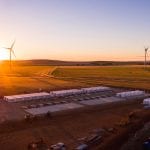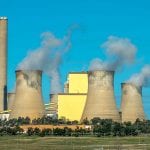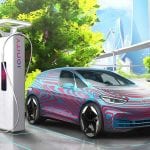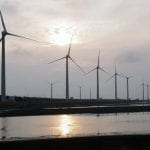Around The Web
SA big batteries again steer state through interconnector dramas
 South Australian big batteries again step up to provide crucial balancing services after the state – again – separated from the rest of the NEM.
South Australian big batteries again step up to provide crucial balancing services after the state – again – separated from the rest of the NEM.
The post SA big batteries again steer state through interconnector dramas appeared first on RenewEconomy.
After a summer of extremes, here's what to expect this autumn
Cherry Tree wind farm set to start sending power to Victorian grid
 John Laing-owned 57MW Cherry Tree wind farm set to start sending power to grid after turbine construction completed, and the long-delayed project was energised.
John Laing-owned 57MW Cherry Tree wind farm set to start sending power to grid after turbine construction completed, and the long-delayed project was energised.
The post Cherry Tree wind farm set to start sending power to Victorian grid appeared first on RenewEconomy.
Department officials walk back Coalition coal funding promises, say no decisions made
 Federal energy department officials downplay Morrison government coal power funding commitments, saying no final decisions made on Collinsville or Liddell.
Federal energy department officials downplay Morrison government coal power funding commitments, saying no final decisions made on Collinsville or Liddell.
The post Department officials walk back Coalition coal funding promises, say no decisions made appeared first on RenewEconomy.
Bloodhound car: A month to save land speed record project
Climate concerns grow amid wettest February on record
CP Daily: Monday March 2, 2020
California offset task force may recommend amending existing protocols
#FrontlineLive: experts answer your questions on the impacts of the climate emergency
To mark the end of The Frontline series a panel of experts answer your questions about the climate crisis and how it is affecting Australia.
Ask Prof Lesley Hughes, Greg Mullins, Prof Michael Mann and Assoc Prof Donna Green your questions, and see the answers on our live blog. Email frontline.live@theguardian.com or tweet #frontlinelive
12.03am GMT
And now our second-last question for Prof Hughes.
From Micaela Ledin:
For those of us who are feeling overwhelmed and helpless right now, what bigger steps can we take as individuals? (Beyond cutting plastic, less water, less driving etc). What actions, specifically, should we be demanding our government to do?
Use your vote wisely - make sure your parliamentary representatives know that climate change policy will be the number one reason determining your vote at the next election. In the meantime, add your signature to Zali Steggall’s climate bill.
Think about where your money is - in insurance, superannuation and banks. If your bank, insurance company or super fund is investing in fossil fuels, move your money and tell them why. The website Market Forces is a great resource to support this action. Put solar panels on your house if you can, or buy green power if you can’t.
11.58pm GMT
From grape to grain: how a warming climate is changing what we eat and drink https://t.co/H85FhnoR28
This is 'The Lost Harvest', the final episode in @GuardianAus's multimedia series #TheFrontline: inside Australia's #climateemergency pic.twitter.com/FaT20ib3SR
Outdoor air pollution cuts three years from human lifespan – study
Global survey finds average figure is higher than that caused by smoking tobacco
Humans are missing out on almost three years of life expectancy on average because of outdoor air pollution, researchers have found.
However, the study reveals more than a year of life expectancy could be clawed back if fossil fuel emissions are cut to zero, while if all controllable air pollution is cut – a category that does not include particles from natural wildfires or wind-born dust – global life expectancy could rise by more than 20 months.
Continue reading...Know your NEM: AEMO sells solar and battery short in transition blueprint
 AEMO has sold the deployment of solar and costs of battery storage well short in its 20-year plan, according to industry experts.
AEMO has sold the deployment of solar and costs of battery storage well short in its 20-year plan, according to industry experts.
The post Know your NEM: AEMO sells solar and battery short in transition blueprint appeared first on RenewEconomy.
Great new all-electric cars that you cannot buy in Australia
 Interested in buying an electric vehicle in Australia? Good luck. It won’t take you long to discover that the choice is not large, barely more than a handful, compared to a wide choice available in Europe.
Interested in buying an electric vehicle in Australia? Good luck. It won’t take you long to discover that the choice is not large, barely more than a handful, compared to a wide choice available in Europe.
The post Great new all-electric cars that you cannot buy in Australia appeared first on RenewEconomy.
How to run the National Electricity Market on 96 per cent renewables
 Windlab simulation of 96% renewable NEM shows very high renewables penetration is possible with boosted wind and solar, firmed by existing hydro and readily achievable levels of storage.
Windlab simulation of 96% renewable NEM shows very high renewables penetration is possible with boosted wind and solar, firmed by existing hydro and readily achievable levels of storage.
The post How to run the National Electricity Market on 96 per cent renewables appeared first on RenewEconomy.
Three “breakthrough” clean energy technologies of the 2020s identified
 DNV GL names three new technologies that could “significantly decarbonise” CO2-heavy industries by 2030, including battery chemistries, heat pumps and green hydrogen.
DNV GL names three new technologies that could “significantly decarbonise” CO2-heavy industries by 2030, including battery chemistries, heat pumps and green hydrogen.
The post Three “breakthrough” clean energy technologies of the 2020s identified appeared first on RenewEconomy.
Victoria energy efficiency market rides wave of optimism, NSW hopes to follow
 After an eye-watering rally, VEEC market settles in mid $30s awaiting government's response. Meanwhile, a waiting game of sorts is also playing out north of the border.
After an eye-watering rally, VEEC market settles in mid $30s awaiting government's response. Meanwhile, a waiting game of sorts is also playing out north of the border.
The post Victoria energy efficiency market rides wave of optimism, NSW hopes to follow appeared first on RenewEconomy.
South Australia blasted for issuing permit to cull southern hairy-nosed wombats
Traditional owners and environmental groups criticise issuing of permit on area of Yorke Peninsula leased to a farmer
South Australian authorities have been criticised by traditional owners and environmental groups for issuing a permit for the culling of southern hairy-nosed wombats on the Yorke Peninsula.
The permit was issued for Aboriginal Lands Trust lands at Point Pearce, which are leased to a farmer, under laws that allow for the culling of “abundant wildlife” that is “causing damage”.
Continue reading...ETS harmonisation, integrity key to future TCI cap-and-trade system -stakeholders
The world may lose half its sandy beaches by 2100. It’s not too late to save most of them
The Guardian view on an energy U-turn: the winds of change | Editorial
The lifting of a destructive ban on new onshore wind power is a breath of fresh air
The government’s decision to overturn an effective five-year-old ban on new onshore wind power generation is hugely welcome. Wind provides the cheapest energy, with the first subsidy-free contracts for offshore projects awarded last year. Onshore wind is even cheaper. It is also popular, scoring above other infrastructure (including roads and railway stations) in opinion polls despite the efforts of climate denialists to portray it as a public nuisance. Most importantly, it is renewable and very low-carbon. Unlike oil, gas and coal, wind does not produce greenhouse gases (apart from in the initial phase of manufacturing and installation) and is not something we can run out of. Unlike nuclear, it does not produce toxic waste as a byproduct.
The government’s climate advisers say that onshore wind power capacity will need to triple in 15 years if the UK is to meet the target of net-zero emissions by 2050. This is a huge challenge, and forms just one part of an even bigger one. The good news is that the UK’s wind sector is already – and despite David Cameron’s foolish decision to stymie it – a world-beating one. While the solar power industry was seriously damaged by the removal of subsidies, with domestic installations collapsing after the withdrawal of feed-in tariffs, wind companies were able to shift resources and expertise offshore.
Continue reading...More than 80% of Indian Ocean dolphins may have been killed by commercial fishing, study finds
An estimated 4m small cetaceans caught as by-catch in commercial tuna fishing nets since 1950, researchers say
Dolphin numbers in the Indian Ocean may have dropped by more than 80% in recent decades, with an estimated 4m small cetaceans caught as “by-catch” in commercial tuna fishing nets since 1950, according to a study.
As many as 100,000 cetaceans – mainly dolphins – were caught in commercial gill nets as by-catch in 2006, with current annual numbers at about 80,000.
Continue reading...


